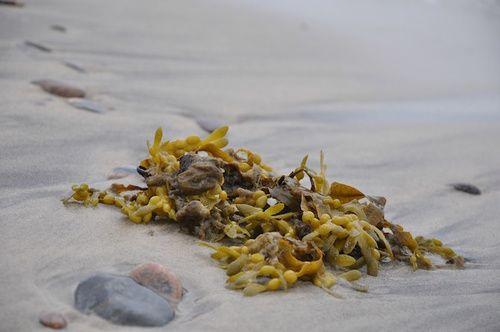L'alga fucus is a seaweed useful for stimulating metabolism, promoting weight loss and bowel movements. Let's find out better.
> 1. Description of the seaweed
> 2. Properties and use of the fucus algae
> 3. Benefits of fucus
> 4. Contraindications of the fucus algae

Description of the seaweed
The fucus seaweed, Fucus vesiculosus, of the Fucaceae family, also known as Sea oak or Kelp seaweed, it is a seaweed, of which the thallus is used and which contains many trace elements, including iodine (at least 0,05%), vitamins, polyphenols, tannins, sterols and mucilages.
The majority of the species of the genus fucus inhabit the cold seas, around the British Isles and in the Atlantic islands of America and northern Europe, however there are some with a broad tolerance for the temperate and warm regions which, however, lose capacity for sexual reproduction, such as the fucus which also grows along the rocky coasts of Morocco.
Properties and use of the fucus alga
The fucus is known for its slimming and metabolic stimulating properties. Contains trace elements, such as iodine, B vitamins, especially B5, and vitamin C. There is no shortage of mucilages, tannins, polyphenols and sterols.
The iodine contained in the fucus, absorbed from the sea, present both in inorganic form and bound to proteins, during intake, is easily assimilated by the body and goes to concentrate in the thyroid, where it is incorporated in the thyroid hormones, thyroxine and triiodothyronine.
These in turn stimulate the basal metabolism, accelerate the turnover, regulating the process of synthesis of fats by our body.
Also discover the properties and use of fucus mother tincture
Benefits of fucus
The fucus therefore, carrying out a stimulating action of the metabolism, fimproves thyroid function in case of hypothyroidism.
For this reason it is used as a slimming (excellent starter in diets to reduce overweight) in the treatment of cellulite, in obesity, and also has a secondary laxative action.
The mucilages present in the alga make it effective against gastroesophageal reflux because they have an anti-inflammatory and protective action on the mucous membrane of the stomach thanks to the sticky gels formed by the alginates that flare up the tissues.
Contraindications of the fucus algae
The fucus is contraindicated in cardiopathic patients, in particular if you are a carrier of tachycardic arrhythmias, in severe arterial hypertension, in pregnancy and during breastfeeding. It should not be used in patients with thyroid, hyperthyroid or hypothyroid disease, because fucus can have several side effects.
READ MORE
The phytotherapeutic properties, use and contraindications of fucus
Other articles on fucus seaweed:
> Lose weight with fucus
> Fucus among the remedies for cellulite and overweight
> Alga fucus among the supplements for weight loss
> The algae enemy of cellulite


























